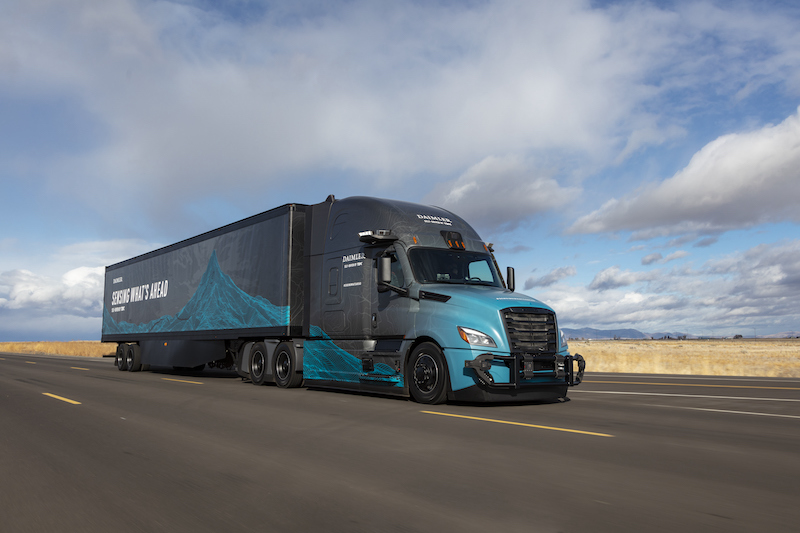Mercedes’ autonomous truck developer Torc Robotics selects Amazon as preferred cloud provider for self-driving truck fleet
Autonomous truck developer Torc Robotics, part of automotive giant Daimler Mercedes-Benz, has selected Amazon Web Services as its preferred cloud provider to handle the scale and speed needed for data transfer, storage, and compute capacity as the company prepares to launch its fleet of next-generation self-driving test trucks in New Mexico and Virginia.
Torc says that, with the growth in test fleet size, number of routes, and sensor capability, there is an increase in data ingestion and analysis needs by engineering teams in the US and in Germany.
Torc is an independent subsidiary of Daimler Truck, responsible for commercializing a Level 4 autonomous system that will be offered to trucking customers. As defined by the Society of Automotive Engineers (SAE), under Level 4 autonomy, a vehicle is capable of performing all driving functions under specified operating conditions.
AWS says its “extensive capabilities” are designed to provide rapid, secure data transfer, intelligent tiered storage, managed orchestration and analytics tools, and high-performance multi-core CPU and GPU compute to help Torc rapidly scale its agile and cost-efficient development platform and accelerate its testing and commercialization of the technology.
Torc’s test fleet in New Mexico is already generating petabytes of data (1 petabyte is 1 million gigabytes) from tests on public roads. Torc’s end-to-end software stack collects and processes raw data from multiple sensors such as lidar, radar and cameras.

In addition to the expansion of routes and fleet size, the next generation of test trucks has integrated more sensors at higher resolutions to enhance object detection at longer ranges – further increasing the magnitude of data for analysis, simulation, and machine learning.
Michael Fleming, Torc’s CEO, says: “Our next generation fleet of test trucks will help us rapidly grow our capabilities and accelerate the commercialization of Level 4 self-driving trucks.
“Our ability to handle the data involved must be able to keep up – whether it’s for transfer, storage, or scaling our simulation capability. With AWS, we have a trusted solution that provides the computing scale, transfer speed, and security when we need it.”
Wendy Bauer, director of automotive sales, AWS, says: “The race to develop self-driving vehicles generates massive volumes of data from many types of sensors.
“With AWS, Torc engineers have the speed, flexibility, and insights they need to design tests, run simulations at scale, and refine their experiments using a broad range of highly specialized compute instance types.
“By pairing Torc’s industry-leading technology with AWS’s reliability, security, and deep expertise in autonomous vehicle development, Torc is positioned to remain a leader and introduce the benefits of self-driving trucks to society.”
Dr Peter Vaughan Schmidt, head of Daimler Trucks’ Autonomous Technology Group, which Torc is a part of, says: “We believe this relationship between Torc and AWS brings together two very strong teams and is another milestone on our road to Level 4 trucks.
“Daimler Trucks’ goal is to enable safe deployment of self-driving trucks and shape the future of the trucking and logistics industry at large.”
Torc’s Level 4 self-driving vehicle system utilizes on-board computers that process sensor data in real time and host software that handles the dynamic driving tasks during autonomous runs.
Torc will leverage AWS to increase the efficiency of data transfer from its on-road routes as their team continues to enhance the system.
Ben Hastings, Torc’s CTO, says: “AWS is an ideal platform for the ingest, storage, and post-processing of massive amounts of data collected by our on-road test fleet.”
Torc’s development team will utilize AWS for both low- and high-demand tasks, as well as data sharing across remote teams.
Torc will leverage AWS managed services such as:
- Amazon Elastic Kubernetes Service (Amazon EKS) for running simulation software at scale;
- Amazon Managed Streaming for Apache Kafka (Amazon MSK);
- Amazon Managed Workflows for Apache Airflow (MWAA); and
- Amazon Simple Storage Service (Amazon S3) Intelligent-Tiering to efficiently manage test data and support regulatory compliance.
This integration on AWS will allow Torc to transfer massive amounts of data for log analysis of real-world tests, while also providing computational power for simulation and deep learning.
Hastings says: “Our software is tested in simulation using a combination of synthetic scenarios and replayed sensor data.
“These tests often stack up in ways that create significant peak demands for compute resources. With AWS, we get a solution that can dynamically scale to meet the needs of the engineering and virtual testing teams without having to acquire and maintain our own datacenters.”

